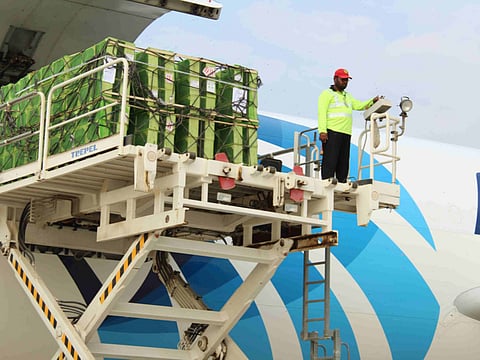60m honeybees create a buzz at RAK airport
Arrivals in cargo promptly transported by honey producers to UAE farms

Ras Al Khaimah: A flight from Cairo landed at Ras Al Khaimah International Airport on Sunday with 60 million precious passengers — honeybees.
The honeybees, destined for farms across the UAE, were promptly picked up by waiting customers after their arrival on Egyptair Cargo at 3.45pm on Sunday. It marks the first time the freighter has transported honeybees to RAK.
The huge number of honeybees arriving reflects the growing honey production industry in the UAE, which annually exports over 1,800 tonnes of honey.
Shaikh Salem Bin Sultan Al Qasimi, chairman of the airport and the civil aviation department, welcomed the flight, saying, “RAK Airport is ideally positioned to handle this precious cargo and we are grateful to Egyptair Cargo and Al Najeh Honey & Bees Trading to give us the opportunity to demonstrate our capabilities in this regard. We also appreciate all the support provided by the Ministry of Environment and Climate Change, RAK Customs and other authorities.”
The bees were part of a re-stocking exercise that takes place regularly, and have to be handled with great care.
Mohammad Al Najeh, who runs the operation and heads Al Najeh, said the exercise of getting the bees from Egypt “has to run like clockwork to avoid disaster”.
The flight’s timing is chosen so that the bees arrive after the fierce midday heat and are met immediately by the 30 customers who pick them up and head back to the farms. Inside the aircraft, the temperature is set to -15 degrees Celsius in order to offset the high temperatures that the mass of bees create.
Last week Philip McCabe, president of Apimondia, the world beekeeping federation, visited the UAE in order to learn about the process undertaken by Al Najeh.
RAK Airport CEO Mohammad Qazi said: “We have been planning this operation for many months and our goal is simply to become the leader in the industry to deliver complete operational excellence for handling live bees. Our infrastructure is best suited for such operations and we will ensure we continue to improve and surpass our already established high standards.”



